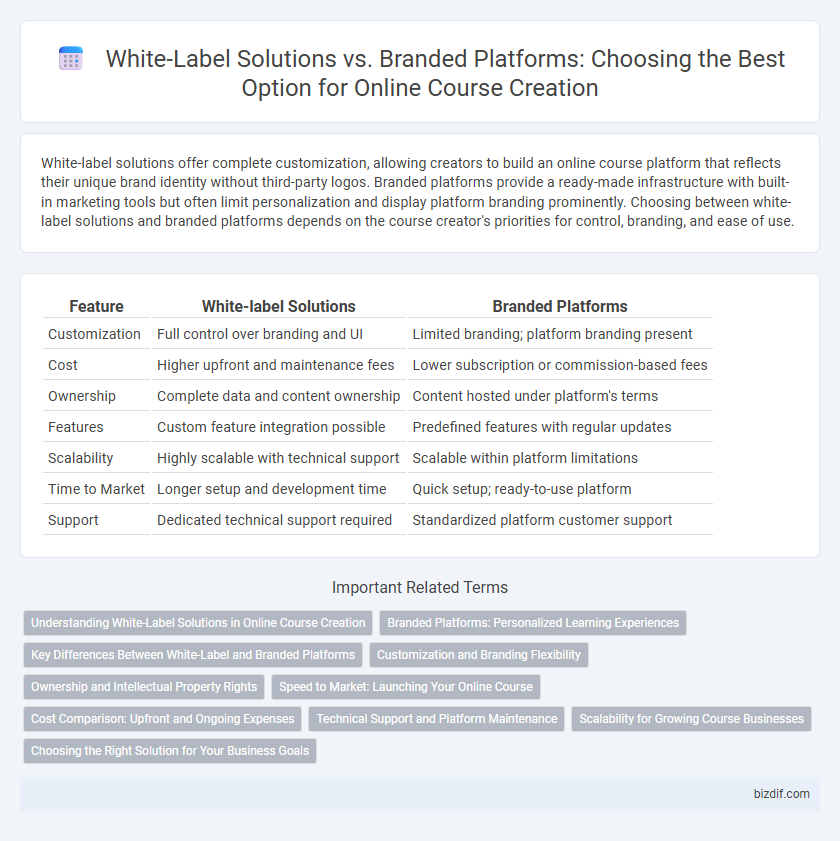White-label solutions offer complete customization, allowing creators to build an online course platform that reflects their unique brand identity without third-party logos. Branded platforms provide a ready-made infrastructure with built-in marketing tools but often limit personalization and display platform branding prominently. Choosing between white-label solutions and branded platforms depends on the course creator's priorities for control, branding, and ease of use.
Table of Comparison
| Feature | White-label Solutions | Branded Platforms |
|---|---|---|
| Customization | Full control over branding and UI | Limited branding; platform branding present |
| Cost | Higher upfront and maintenance fees | Lower subscription or commission-based fees |
| Ownership | Complete data and content ownership | Content hosted under platform's terms |
| Features | Custom feature integration possible | Predefined features with regular updates |
| Scalability | Highly scalable with technical support | Scalable within platform limitations |
| Time to Market | Longer setup and development time | Quick setup; ready-to-use platform |
| Support | Dedicated technical support required | Standardized platform customer support |
Understanding White-Label Solutions in Online Course Creation
White-label solutions in online course creation allow businesses to customize and rebrand a pre-built platform, providing full control over the user experience without developing software from scratch. These solutions offer seamless integration of brand elements such as logos, colors, and domain names, enhancing professional credibility and student trust. Compared to branded platforms, white-label options enable scalability and flexibility, ideal for educators and organizations seeking to maintain brand consistency while leveraging advanced LMS features.
Branded Platforms: Personalized Learning Experiences
Branded platforms offer personalized learning experiences by allowing course creators to customize the interface, content delivery, and user engagement with their unique branding elements. These platforms enhance learner trust and recognition, leading to higher completion rates and better student retention. Customization features such as custom domains, logos, and tailored dashboards create a seamless and immersive educational environment aligned with the creator's brand identity.
Key Differences Between White-Label and Branded Platforms
White-label solutions offer customizable online course platforms that allow creators to fully control branding elements such as logos, color schemes, and domain names, providing a seamless brand experience for learners. In contrast, branded platforms typically restrict customization, often displaying the host company's logo and design, which can dilute the creator's unique brand identity. White-label platforms require more setup and investment but enable greater flexibility and ownership, while branded platforms offer quicker deployment with less technical overhead.
Customization and Branding Flexibility
White-label solutions offer extensive customization and branding flexibility, enabling businesses to fully tailor their online courses to align with their unique brand identity, including logos, colors, and domain names. Branded platforms often provide limited customization options, restricting businesses to their preset templates and design elements, which can compromise brand consistency. Choosing white-label services empowers educators to deliver a seamless branded experience, increasing user trust and engagement through complete control over visual and functional aspects.
Ownership and Intellectual Property Rights
White-label solutions offer course creators full ownership and control over their content by allowing customization under their own brand, ensuring all intellectual property rights remain intact. In contrast, branded platforms often retain partial rights to course materials and may impose restrictions on content usage and distribution. Choosing white-label solutions maximizes autonomy and protects creators' intellectual property, fostering long-term business growth.
Speed to Market: Launching Your Online Course
White-label solutions offer rapid deployment by providing pre-built, customizable frameworks that minimize development time, enabling course creators to launch quickly. Branded platforms often require extensive setup and design customization, which can delay the time to market but offer a unique identity and tailored user experience. Prioritizing speed to market favors white-label options, especially for educators seeking immediate audience engagement and revenue generation.
Cost Comparison: Upfront and Ongoing Expenses
White-label solutions typically involve lower upfront costs since they leverage pre-built frameworks, reducing the need for extensive development. Branded platforms often require higher initial investment due to custom design and unique feature integration, alongside ongoing maintenance expenses. Evaluating subscription fees, licensing costs, and scalability requirements is crucial for determining the most cost-effective option in online course creation.
Technical Support and Platform Maintenance
White-label solutions for online course creation offer dedicated technical support and handle platform maintenance to ensure seamless functionality while allowing complete brand customization. Branded platforms provide integrated support services and regular updates but may limit customization and control over technical aspects. Choosing white-label solutions often results in greater flexibility in maintenance management and tailored support aligned with specific business needs.
Scalability for Growing Course Businesses
White-label solutions offer scalability by allowing course creators to customize and expand their online learning environments without limitations imposed by third-party branding. Branded platforms may restrict growth through fixed features and limited customization options, potentially hindering the ability to adapt as course offerings increase. Choosing white-label solutions enables seamless integration of new courses, user management systems, and monetization strategies essential for scaling growing course businesses.
Choosing the Right Solution for Your Business Goals
Selecting the ideal online course creation platform depends on your business goals, whether prioritizing full customization with white-label solutions or leveraging the ease and recognition of branded platforms. White-label solutions offer complete control over branding, user experience, and monetization strategies, making them suitable for businesses focused on long-term growth and unique identity. Branded platforms provide built-in audience access and simplified management, fitting businesses aiming for quick launches and minimal technical involvement.
White-label solutions vs Branded platforms Infographic

 bizdif.com
bizdif.com